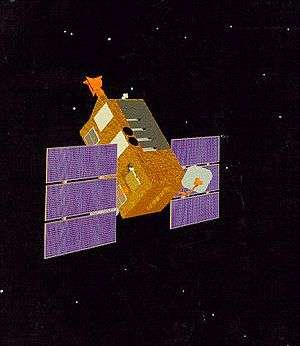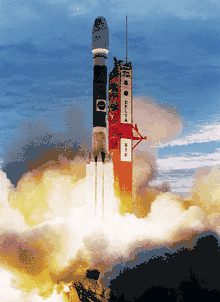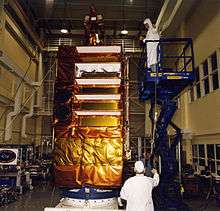Rossi X-ray Timing Explorer
The Rossi X-ray Timing Explorer (RXTE) was a satellite that observed the time variation of astronomical X-ray sources, named after physicist Bruno Rossi. The RXTE had three instruments—an All Sky Monitor, the Proportional Counter Array, and the High-Energy X-ray Timing Experiment (HEXTE). The RXTE observed X-rays from black holes, neutron stars, X-ray pulsars and X-ray bursts. It was funded as part of the Explorer program, and is sometimes also called Explorer 69.
 Artist impression of RXTE telescope | |||||||
| Names | RXTE XTE Explorer 69 | ||||||
|---|---|---|---|---|---|---|---|
| Mission type | Astronomy | ||||||
| Operator | NASA | ||||||
| COSPAR ID | 1995-074A | ||||||
| SATCAT no. | 23757 | ||||||
| Website | RXTE home page | ||||||
| Mission duration | 16 years, 6 days | ||||||
| Spacecraft properties | |||||||
| Manufacturer | GSFC MIT (All-Sky Monitor) | ||||||
| Launch mass | 3,200 kg (7,100 lb) | ||||||
| Power | 800 W | ||||||
| Start of mission | |||||||
| Launch date | 13:48, December 30, 1995 (UTC)[1] | ||||||
| Rocket | Delta II 7920 | ||||||
| Launch site | Cape Canaveral SLC-17A | ||||||
| End of mission | |||||||
| Disposal | Decommissioned | ||||||
| Deactivated | January 5, 2012 | ||||||
| Decay date | April 30, 2018[2] | ||||||
| Orbital parameters | |||||||
| Reference system | Geocentric | ||||||
| Regime | Low Earth | ||||||
| Semi-major axis | 6,753 km (4,196 mi) | ||||||
| Eccentricity | 0.0002672 | ||||||
| Perigee altitude | 380.9 km (236.7 mi) | ||||||
| Apogee altitude | 384.5 km (238.9 mi) | ||||||
| Inclination | 22.9842 degrees | ||||||
| Period | 92.1 minutes | ||||||
| RAAN | 221.8627 degrees | ||||||
| Argument of perigee | 256.7652 degrees | ||||||
| Mean anomaly | 103.2545 degrees | ||||||
| Mean motion | 14.04728277 rev/day | ||||||
| Epoch | 27 April 2016, 10:21:58 UTC[3] | ||||||
| Revolution no. | 13218 | ||||||
| Main telescope | |||||||
| Type | Proportional counter Scintillator (HEXTE) | ||||||
| Wavelengths | 2–250 keV (X-ray) | ||||||
| Instruments | |||||||
| |||||||
Medium-Class Explorers | |||||||
RXTE had a mass of 3200 kg and was launched from Cape Canaveral on 30 December 1995 on a Delta rocket. Its International Designator is 1995-074A.
History
Observations from the Rossi X-ray Timing Explorer have been used as evidence for the existence of the frame-dragging effect predicted by the theory of general relativity. RXTE results have, as of late 2007, been used in more than 1400 scientific papers.
In January 2006, it was announced that Rossi had been used to locate a candidate intermediate-mass black hole named M82 X-1.[5] In February 2006, data from RXTE was used to prove that the diffuse background X-ray glow in our galaxy comes from innumerable, previously undetected white dwarfs and from other stars' coronae.[6] In April 2008, RXTE data was used to infer the size of the smallest known black hole.[7]
RXTE ceased science operations on 3 January 2012.[8]
NASA scientists said that the decommissioned RXTE would re-enter the Earth's atmosphere "between 2014 and 2023".[9] Later it became clear that the satellite would re-enter in late April or early May 2018,[10] and the spacecraft fell out of orbit on April 30, 2018.[11]
Instruments

All-Sky Monitor (ASM)
The ASM consisted of three wide-angle shadow cameras equipped with proportional counters with a total collecting area of 90 square cm. The instrumental properties were:[12]
- Energy range: 2–12 keV
- Time resolution: observes 80% of the sky every 90 minutes
- Spatial resolution: 3' × 15'
- Number of shadow cameras: 3, each with 6 × 90 degrees FOV
- Collecting area: 90 cm2
- Detector: Xenon proportional counter, position-sensitive
- Sensitivity: 30 mCrab
It was built by the CSR at MIT. The principal investigator was Dr. Hale Bradt.
Proportional Counter Array (PCA)
The PCA was an array of five proportional counters with a total collecting area of 6500 square cm. The instrument was built by the EUD (formerly 'LHEA') at GSFC. The PCA principal investigator was Dr. Jean H. Swank.
The instrumental properties were:[13]
- Energy range: 2–60 keV
- Energy resolution: < 18% at 6 keV
- Time resolution: 1 µs
- Spatial resolution: collimator with 1 degree FWHM (Full Width at Half Maximum)
- Detectors: 5 proportional counters
- Collecting area: 6500 cm2
- Layers: 1 propane veto; 3 xenon, each split into two; 1 xenon veto layer
- Sensitivity: 0.1 mCrab
- Background: 90 mCrab
The High Energy X-ray Timing Experiment (HEXTE)
The HEXTE consisted of two clusters each containing four phoswich scintillation detectors. Each cluster could "rock" (beamswitch) along mutually orthogonal directions to provide background measurements 1.5 or 3.0 degrees away from the source every 16 to 128 s. In addition, the input was sampled at 8 microseconds so as to detect time varying phenomena. Automatic gain control was provided by using a 241
Am
radioactive source mounted in each detector's field of view. The HEXTE's basic properties were:[14]
- Energy range: 15–250 keV
- Energy resolution: 15% at 60 keV
- Time sampling: 8 microseconds
- Field of view: 1 degree FWHM
- Detectors: 2 clusters of 4 NaI/CsI scintillation counters
- Collecting area: 2 × 800 cm2
- Sensitivity: 1 Crab = 360 count/s per HEXTE cluster
- Background: 50 count/s per HEXTE cluster
The HEXTE was designed and built by the Center for Astrophysics & Space Sciences (CASS) at the University of California, San Diego. The HEXTE principal investigator was Dr. Richard E. Rothschild.
See also
- Neutron Star Interior Composition Explorer (NICER, launched June 2017 attached to ISS)
- List of X-ray space telescopes
References
- "RXTE Mission". Heasarc.gsfc.nasa.gov. 2002-02-22. Retrieved 2012-02-03.
- Reddy, Francis. "NASA's Rossi X-ray Timing Explorer Leaves Scientific 'Treasure Trove'". NASA. Retrieved 3 May 2018.
- "XTE Satellite details 1995-074A NORAD 23757". N2YO. 27 April 2016. Retrieved 27 April 2016.
- The RXTE All Sky Monitor Data Products
- "Dying Star Reveals More Evidence for New Kind of Black Hole". ScienceBlog.com. Retrieved 2012-02-03.
- "Galactic Glow Gleaned".
- "NASA Scientists Identify Smallest Known Black Hole". 2008-04-01.
- "The RXTE Mission is Approaching the End of Science Operations". 2012-01-04.
- "NASA's ageing black hole-stalking probe switched off". 2012-01-11.
- "NASA FAQ: RXTE Spacecraft Re-entry". NASA. Retrieved 30 April 2018.
- "A Pioneering NASA Satellite Just Fell to Earth After 2 Decades in Space". Space.com. Retrieved 2018-05-15.
- "All-Sky Monitor (ASM)". Heasarc.gsfc.nasa.gov. 2002-02-04. Retrieved 2012-02-03.
- "About RXTE The PCA". Heasarc.gsfc.nasa.gov. 2011-12-06. Retrieved 2018-10-05.
- "High Energy X-ray Timing Experiment (HEXTE)". Heasarc.gsfc.nasa.gov. 1999-09-14. Retrieved 2012-02-03.

External links
| Wikimedia Commons has media related to RXTE. |
.png)